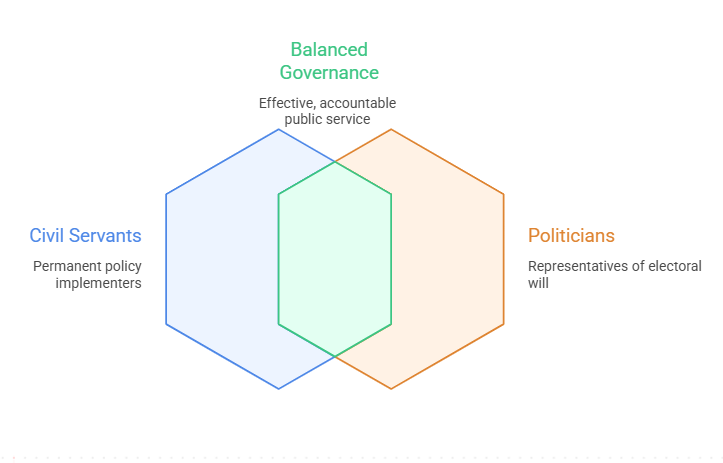-
04 Jul 2025
GS Paper 2
Polity & Governance
Day 17: “The balance between political accountability and bureaucratic autonomy is essential for effective governance.” Discuss this statement in the context of recent debates on lateral entry, performance evaluation, and tenure security in the Indian civil services.(250 words)
Approach
- Define political accountability and bureaucratic autonomy in the context of effective governance
- Discuss the recent debates on lateral entry, performance evaluation, and tenure security in the Indian civil services.
- Conclude with a way forward.
Introduction:
In a democratic system, political accountability ensures that elected representatives act in the public interest, while bureaucratic autonomy allows civil servants to perform their duties with professionalism, neutrality, and continuity. A healthy balance between these two pillars is crucial for effective governance. However, recent debates around lateral entry, performance evaluation, and tenure security have brought this equilibrium under scrutiny in India.
Body
Lateral Entry into Civil Services
- The government introduced lateral entry at the Joint Secretary level to bring domain expertise and private sector efficiency.
- In 2018 and 2021, professionals were inducted into key ministries like Finance, Agriculture, and Environment.
- Concerns:
- May bypass UPSC’s merit-based selection system.
- Could lead to politicization or contractual loyalty over institutional commitment.
Performance Evaluation Reforms
- Traditional Annual Confidential Reports (ACRs) are being replaced by 360-degree appraisals and systems like SPARROW (Smart Performance Appraisal Report Recording Online Window).
- The reform aims to promote meritocracy, holistic feedback, and accountability, moving beyond seniority-based evaluations to performance-based governance.
- Concerns:
- Subjectivity and non-transparency in feedback from anonymous peers, juniors, and subordinates.
- Vulnerability to political influence and bias, potentially undermining fairness and officer morale.
Tenure Security
- Frequent and arbitrary transfers of civil servants significantly undermine the efficiency and effectiveness of the bureaucracy.
- Such instability disrupts policy continuity, hampers the implementation of long-term projects, and often leads to demoralization among officers.
- Honest officers like Ashok Khemka (Haryana) and Durga Shakti Nagpal (UP) faced punitive transfers for resisting political interference.
Reform Recommendations
- Lateral entrants must be recruited through independent and transparent mechanisms with orientation in public service values.
- Create objective, quantifiable, and audited Key Performance Indicators (KPIs) tied to outcomes, not just inputs.
- Strengthen institutional mechanisms for appointments, transfers, and evaluations through statutory Civil Services Boards.
- In T.S.R. Subramanian v. Union of India (2013), the Supreme Court mandated minimum fixed tenure and emphasized bureaucratic independence.
- Encourage constructive interaction between ministers and civil servants through codified protocols.
Conclusion
As the Second ARC observed,
“Good governance is not about choosing between autonomy and accountability, but achieving a dynamic balance between them.”
For India’s civil services to remain efficient, impartial, and citizen-centric, reforms must promote a governance culture where professional independence coexists with democratic responsiveness.





